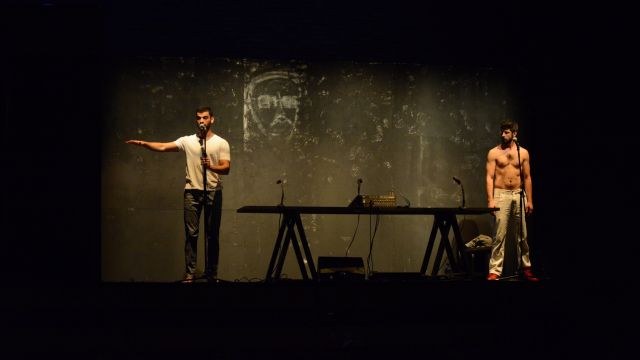While I Was Waiting
Performed in Arabic, with English surtitles, the Australian premiere of While I Was Waiting is a unique opportunity to gain insight into the very real lives of families caught up in the current Syrian turmoil. Syrian playwright Mohammad Al Attar and director Omar Abusaada powerfully humanise a political situation, giving the audience the chance to interact with the trauma that besets families, by being invited into their living, loving and grieving.
The story, it appears, is not so ‘far-fetched’ in modern Syria. A young man, heading through Damascus, goes through the requisite checkpoints and is mysteriously beaten, almost to death. The audience meets him and his loved ones as he lies in his hospital bed. Taim, played by Kinan Hmidan is in a coma, but his spirit, Mustafa Kur, is helpless, and restless. Using a well-designed two -tiered stage, Taim hovers above the story, unable to communicate, but seeming to guide the story. We discover that he is a petty drug dealer and this is given as the reason for his ‘accident’- or is it?
The show opens, somewhat symbolically, with the cast warmly embracing each other, then dressing in front of the audience to become the storytellers. Hanan Chkir, as Taim’s mother has resorted to religious adherence. The mother has pushed her daughter, played by Nanda Mohammad away, and is angry, scornful and stoic in her suffering. Mohammad and Chkir both give impassioned performances.
Taim’s live-in girlfriend, Reham Kassar does not fit in with the family and hangs on to the thread of hope that he will recover, vacillating between sorrow and resignation. Her memories of their life together rest in nurturing their shared cactus plant.
Taim’s long-time friend and mentor, played by Mohamad Alreshi, shamelessly appears to smoke hashish and secretly believes that he may have driven Taim to his death. He seems irredeemable and has an unrequited passion for Taim’s sister. He flirts, cajoles and wallows.
Taim’s coma is obviously used by the authors as a metaphor for war-ravaged Syria. It is a country hovering between hope and despair, life and death, and the coma unites them.
Taim is also portrayed as a filmmaker who has resorted to documenting the story of Syria and his family in film. He, and his hovering spirit share the horrors of what has happened to them, and what they have seen, through Taim’s film. Both the video artist, Reem Alghazi and the music artist, Samer Saemaldaher have designed sounds and images that calmly, but evocatively introduce the audience to the horrors of war.
All of the characters are trapped in time, waiting to see if Taim wakes up, unable to move on, recapture their lives or to change what is happening in their country and it is not until the end of what seems like a long 90 minute performance, that we see any glimmer of people moving forward. While the play is somewhat wordy and some of the interactions seem unnecessary, the torment portrayed by the players, holds.
The use of a character portraying Taim’s spirit in this play can be interpreted in a variety of ways. It certainly represents the ghosts, the untold truths and stories that permeate the lives of people every day in Syria. The spirit comments, that people are “The unburied dead” and laments, “What was I tortured for?” It is a cry for understanding and support from the rest of the world. It is a conscious outreaching from the people of Syria who are struggling in their homeland as it slips from what it was to what it has become.
The OzAsia Festival helps us with a window into the world. This is a bleak view and a reminder that ordinary people live, love, and suffer in all parts of our world.
Jude Hines
Image: Mohamad Alrefai and Mustafa Kur. Photographer: Masashi Hirao
Subscribe to our E-Newsletter, buy our latest print edition or find a Performing Arts book at Book Nook.

